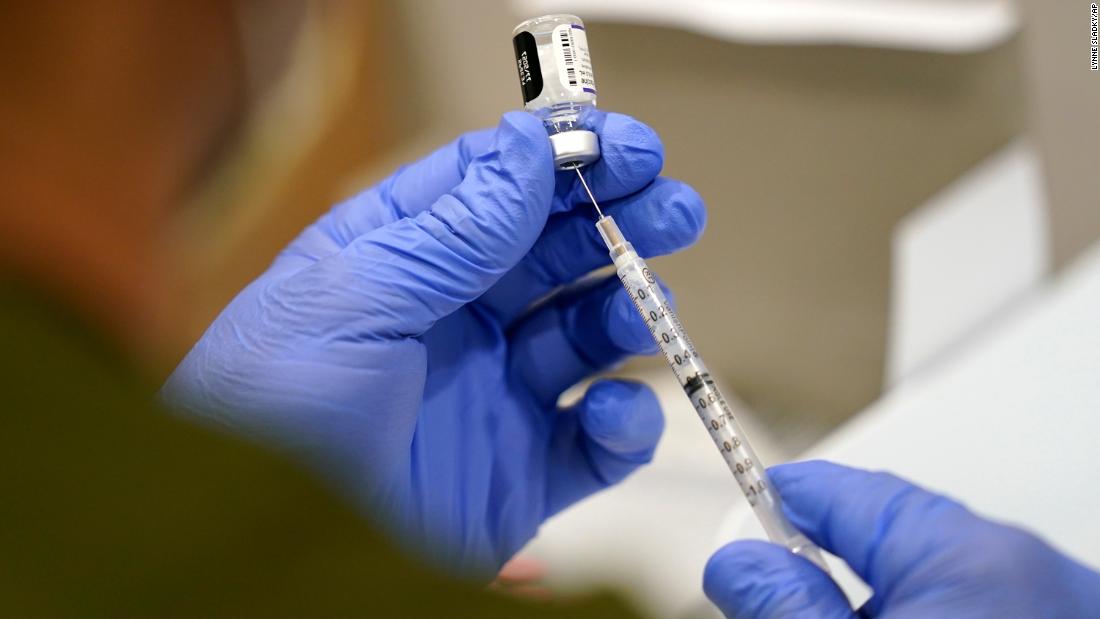J&J vaccine recipients advised to get second dose as soon as possible
“J&J is a very good vaccine. I also believe it’s probably a two-shot vaccine,” said Dr. Ashish Jha, dean of the Brown University School of Public Health. “It’s really urgent that people get that second shot pretty quickly.
“Probably one is not enough. And everybody who has had one needs a second one two months after the first. They are going to get full protection if they do that,” he said.
But as for the J&J vaccine, which was launched as a one-dose regimen, experts point to a combination of waning immunity and the spread of the Delta variant as the primary drivers for a second dose.
The researchers found that among more than 600,000 veterans, J&J’s vaccine’s protection fell from 88% in March to 3% in August. Meanwhile, Moderna’s vaccine protection against infection fell to 64% from 92%, and Pfizer’s declined to 50% from 91% during that same time period.
“I think anybody who’s gotten one dose of the Johnson & Johnson vaccine can benefit from a second dose of a Johnson & Johnson vaccine,” said Dr. Paul Offit, a member of the FDA’s Vaccines and Related Biological Products Advisory Committee.
Offit told CNN’s Jake Tapper that he believes the J&J vaccine would likely have been a two-dose series had the country not been facing the urgency of the pandemic.
The FDA will move to consider the committee’s latest recommendations on J&J and Moderna’s vaccines, and if an emergency use authorization is granted, the CDC would decide who is eligible for the doses.
Pfizer’s third dose was approved last month for people older than 65, and people 18 and older who are at risk of severe disease or who live or work in a situation that puts them at a higher risk for complications or severe disease.
‘Clear need’ for mixing and booster shots, CDC officials says
As more boosters are slated to become available, public health officials and experts have been considering a mix-and-match approach.
Dr. Amanda Cohn, who is the chief medical officer for CDC’s National Center for Immunizations and Respiratory Diseases, said Friday that guidance on mixing and matching booster shots would grant flexibility.
“I think from a public health perspective there’s a clear need in some situations for individuals to receive a different vaccine,” Cohn said, noting for example that J&J recipients may not have access to a second dose of the same vaccine. “So if there’s not any allowable language in the FDA’s fact sheets or EUA authorization, then those individuals are left behind,” she said.
Cohn’s remarks come as FDA vaccine advisers were asked to discuss data showing that it’s safe to mix the three authorized Covid-19 vaccines — Moderna’s, Pfizer’s, and J&J’s — when giving booster shots.
The National Institutes of Health presented early information from an ongoing study showing that it didn’t matter which vaccine people got first and which booster they got — it was safe to mix boosters and it revved up the immune response. Plus, mixing boosters also provided a good response to the Delta variant.
Cohn also noted there’s a rare blood clotting side effect known as thrombosis with thrombocytopenia syndrome or TTS that is more common in young women and associated with the J&J vaccine.
Vaccine mandates continue to face resistance
Experts, including US Surgeon General Vivek Murthy, have said that vaccine mandates are working to boost vaccine numbers. But that’s not without some backlash.
Nationally, the US has fully vaccinated more than 56% of its total population, but health and government officials have been pushing to ramp up those numbers.
In Seattle, though, the police department’s vaccine mandate deadline is Monday, and about 10% of employees have yet to submit vaccination proof.
Data released by the mayor’s shows that 82% of staff at the Seattle Police Department are vaccinated. The remaining 8% are seeking religious or medical exemptions, according to the police department.
“We have seen an increase in submissions over the last week,” Mayor Jenny Durkan’s Chief of Staff Stephanie Formas said in an email to CNN. “COVID-19 is currently the number one cause of death for our first responders and throughout the pandemic, we have seen dozens of firefighters and officers exposed with some hospitalized.”
Also in Washington state, Boeing Everett Factory employees gathered outside the facility Friday in Everett, to protest the company’s vaccine mandate that was announced earlier this week. Workers must be vaccinated by December 8, unless they provide “reasonable accommodation” stemming from a disability or religious beliefs.
“Boeing is committed to maintaining a safe working environment for our employees, and advancing the health and safety of our global workforce is fundamental to our values and a core priority every day,” Boeing said Friday in a statement to CNN after the protest.
CNN’s Maggie Fox, Jen Christensen, Amy Simonson and Whitney Wild contributed to this report.
![]()


